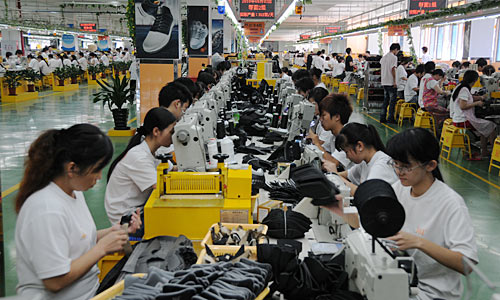|
 |
|
BEAR THE BRUNT: Employees work on the production line of a shoe-making factory in Quanzhou, Fujian Province. Drastic appreciations of the yuan will severely affect China's labor-intensive export-oriented enterprises (LAI JIANQIANG) |
In addition, the euro, British pound and Canadian dollar have all risen against the U.S. dollar as the U.S. Federal Reserve pushes on with its loose monetary policy.
Pros and cons
"We need to know all the advantages and disadvantages of the yuan appreciation for the economy and the people, before we come to any conclusions on this issue," said Yi Xianrong, a researcher with the Institute of Finance and Banking of the Chinese Academy of Social Sciences.
A moderate appreciation of the yuan will benefit China, because Chinese customers who study or travel abroad will spend less for the same amount of goods or services, and imported goods become "cheaper," Yi said.
For domestic enterprises, the yuan's appreciation means cuts in costs of imported energy and raw materials, which can help improve their global competitiveness, because escalating international energy and raw material prices have created a heavy burden on domestic manufacturers, he said.
China's major trading partners, such as the United States, have persistently demanded China to revalue its currency because of its ballooning trade surplus.
"A moderate appreciation of the yuan can help ease tensions, reduce trade disputes, and build China up as a responsible country," he said.
But drastic appreciations of the yuan will harm the Chinese economy, he said. Export-oriented enterprises, particularly labor-intensive companies, will bear the brunt and may even be forced to close their factories if they cannot make profits.
Substantial appreciations can also deter foreign direct investment (FDI) into China. China is now the world's largest FDI recipient. The yuan's appreciation won't sway foreign investors who already have operations in China, but it does mean rising costs for potential investors, who may turn to other developing countries with cheaper costs, he said.
Employment will further suffer if factories cut production or close their doors, or if foreign investors pull back on investment, he said.
Moreover, China's huge foreign exchange reserves will shrink in value if the yuan appreciates drastically, which is a severe challenge the country has to face, he said.
A reasonable float
China should float its currency within an acceptable range and to the degree the economy can stand. But it should not allow the currency to appreciate to the extent European and U.S. enterprises desire, said He Zhicheng, a researcher at the Agricultural Bank of China.
He said a 3-5 percent appreciation is conducive to China's macroeconomy and to the development of a majority of Chinese enterprises. But Chinese enterprises haven't yet prepared for substantial appreciations.
"One dollar for 6.5 yuan is a bottom line now. I think the exchange rate can float between 6.7 and 6.5 yuan per dollar. That's the limit for the Chinese economy and most Chinese enterprises," he said.
He is working on a book about protecting the value of the yuan, which, he thinks, is the same as protecting the capabilities of the Chinese people and Chinese enterprises to create value.
While China's GDP continues to grow, the increases in its trade surplus are slowing down this year. China will also push forward reforms in income distribution, as well as resource and environmental taxes. All these factors are fueling expectations for cost increases in the manufacturing sector, which will also limit the range of the yuan's appreciation, said Sun Huayu, Director of the China Center for International Monetary Research under the University of International Business and Economics.
Whether a country's currency appreciates or not depends on the endurance of its economy, Sun said. China was one of the few countries to suffer a minor blow from the financial crisis, despite problems within its economic growth pattern. And as a manufacturing base, China's ability to sustain stable growth is vital to the global economic recovery.
A quick appreciation of the Chinese currency will undoubtedly interrupt the pace of the country's economic growth and impact the economic recovery worldwide, particularly in the United States and other countries enjoying close trade ties with China, Sun said.
From 2005-08, the yuan appreciated more than 20 percent against the U.S. dollar, but the United States still witnessed an increase of more than 33 percent in its trade deficit with China. Pressing China to appreciate its currency will not help the United States solve its problems, Sun said. | 